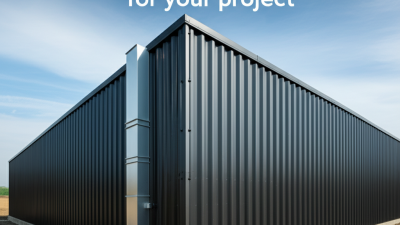
In the realm of modern manufacturing processes, the versatility of sheet metal has become increasingly prominent, fundamentally reshaping how products are designed and produced. Experts like John Smith, a leading figure in the Sheet Metal Metal industry, emphasize the material's adaptability, stating, “Sheet metal is not just a material; it’s an integral part of innovative manufacturing that allows for creativity while maintaining structural integrity.” This perspective highlights the essential role that sheet metal plays in various applications, from automotive to aerospace, showcasing its ability to be customized for different functionalities without compromising quality.
As industries evolve, the capabilities of sheet metal continue to expand, driven by advancements in technology and design methods. This adaptability makes it an indispensable resource for engineers and manufacturers looking to optimize production processes. Understanding the diverse characteristics of sheet metal, including its malleability, durability, and cost-effectiveness, is vital for stakeholders aiming to leverage its potential fully. By exploring the myriad ways in which sheet metal intertwines with contemporary manufacturing, we gain insight into its significance and the innovations it brings to the industrial landscape.

Sheet metal has emerged as an indispensable material in contemporary manufacturing, demonstrating its adaptability across various industries. Its lightweight yet durable characteristics allow for easy handling and fabrication, making it suitable for products ranging from automotive components to intricate electronic housings. The flexibility in forming processes, such as bending, cutting, and welding, enables manufacturers to achieve precise shapes and complex designs that meet specific functional requirements.
Moreover, the use of sheet metal facilitates efficient production methods, including mass production and rapid prototyping. With advancements in technology, techniques like laser cutting and CNC machining enhance the accuracy and efficiency of sheet metal processing. This versatility not only streamlines manufacturing workflows but also reduces waste and lowers production costs, contributing to a more sustainable manufacturing environment. As industries continue to innovate, the role of sheet metal remains crucial, evolving to meet the demands of modern consumer products and advanced technological applications.
Sheet metal is becoming increasingly vital across diverse industries, demonstrating its innovative applications in areas such as automotive, aerospace, and construction. For instance, in the automotive sector, advancements in sheet metal fabrication services are highlighted by robust market growth and an increased focus on high-speed assembly techniques like clinching. This traditional joining process efficiently fabricates components, enabling manufacturers to streamline production while maintaining quality.
Moreover, the trend towards automation has transformed sheet metal bending processes, utilizing precision technology to enhance efficiency in manufacturing. As industries continue to embrace these cutting-edge solutions, exhibitions such as SteelFab showcase the latest technologies in metalworking, emphasizing the importance of innovation in sheet metal applications. With a projected market expansion and a rise in demand for sophisticated sheet metal designs, the future looks promising for this versatile material in modern manufacturing.
| Application Area | Common Materials | Manufacturing Process | Example Products |
|---|---|---|---|
| Automotive | Aluminum, Steel | Stamping, Welding | Car chassis, Panels |
| Aerospace | Titanium, Aluminum | Machining, Forming | Aircraft skins, Structural components |
| Construction | Stainless Steel, Copper | Bending, Laser Cutting | Roofing, Facades |
| Electronics | Aluminum, Steel | Etching, Stamping | Casing, Heat sinks |
| HVAC | Galvanized Steel, Aluminum | Forming, Ductwork fabrication | Ducts, Vents |
Sheet metal is a vital component in modern manufacturing, playing a crucial role in various processes due to its versatility and adaptability. Key manufacturing processes utilizing sheet metal include stamping, bending, and laser cutting. According to a report by Smithers Pira, the global sheet metal market is projected to grow by 5.4% annually, reaching a value of approximately $235 billion by 2025. This growth underscores the importance of sheet metal in diverse sectors such as automotive, aerospace, and construction.
In the stamping process, sheet metal is shaped into precise forms using a die, which is particularly significant in the automotive industry for producing components like body panels and brackets. Bending, on the other hand, allows for intricate designs and structural integrity; a study by the Fabricators & Manufacturers Association noted that more than 25% of manufacturers are investing in automated bending technologies to enhance production efficiency. Additionally, laser cutting is revolutionizing the industry by providing high precision and speed, enabling manufacturers to create complex shapes with minimal waste. With the increasing demand for lightweight and strong materials, the versatility of sheet metal will only continue to expand in modern manufacturing.
Sheet metal has gained immense popularity in modern manufacturing due to its exceptional durability, versatility, and cost-effectiveness. The robust nature of sheet metal allows it to withstand harsh environments and heavy usage, making it an ideal material for a wide range of applications, from automotive parts to structural components in buildings. This inherent strength ensures that products made from sheet metal have a long lifespan, reducing the need for frequent replacements and repairs.
In addition to its durability, sheet metal's versatility is noteworthy. It can be easily fabricated into various shapes and sizes through processes such as bending, cutting, and welding. This adaptability enables manufacturers to create complex designs tailored to specific requirements, enhancing innovation and functionality in product development. Furthermore, the cost-effectiveness of sheet metal is a significant advantage for manufacturers. The raw material is relatively inexpensive, and the efficiency of manufacturing processes minimizes waste, helping to keep production costs low while maintaining high-quality standards. These attributes collectively position sheet metal as a fundamental material in contemporary manufacturing, driving efficiency and creativity across diverse industries.
As the manufacturing landscape evolves, sheet metal technology is poised for significant transformation. Future trends in this sector focus on automation, digital fabrication, and sustainable practices. Advancements such as automated CNC machining and laser cutting are enhancing precision and efficiency, allowing manufacturers to produce complex designs with minimal waste. These technologies not only optimize production speed but also ensure quality control throughout the manufacturing process.
Tips for manufacturers looking to leverage these trends include investing in modular machinery that can adapt to various production needs. Additionally, embracing Industry 4.0 principles—such as real-time data analytics—can greatly improve decision-making capabilities and resource management. Another important aspect is the exploration of eco-friendly materials and processes, which will not only meet regulatory standards but also cater to a growing consumer preference for sustainability.
Moreover, the integration of 3D printing in sheet metal fabrication is opening new avenues for innovation. This method allows for the rapid prototyping of parts and components, reducing lead times and costs. By keeping an eye on these advancements, manufacturers can position themselves at the forefront of the industry, ready to meet future demands with agility and creativity.





